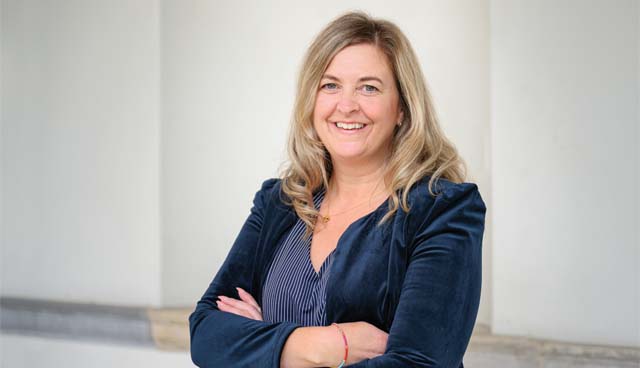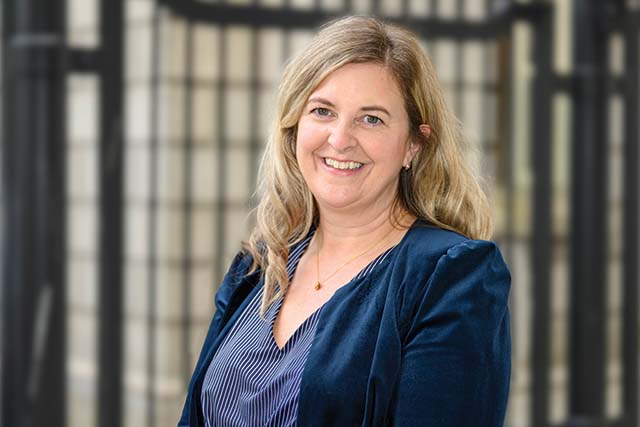Saragh Fitzpatrick: Developing the Oireachtas’ financial functions

Within the Houses of the Oireachtas Service, the Chief Financial Officer (CFO) is tasked with leading and developing all financial functions, across the finance, salaries, and procurement units. Ciarán Galway sits down with Oireachtas CFO Saragh Fitzpatrick to discuss structure, functions, and innovation.
Outlining the main responsibilities of her role as the Oireachtas CFO, Fitzpatrick explains that while the CFO’s units have minimal input into the procedural work of the Houses of the Oireachtas, they are important contributors to the common goal of supporting its legislative function.
Employing the analogy of the Oireachtas as an engine, she observes: “The environment is dynamic, fast moving, and each part is vital to the overall functioning of the organisation. Without the operation of each component, it does not run.”
Delineating the structure of the Finance Unit, the Salaries Unit, and the Procurement Unit, the CFO notes that while there is some synergy between the Finance and Salaries units, they are ultimately three distinct units.
Finance function units
Procurement: The Procurement Unit is responsible for making sure that everything the Houses of the Oireachtas Service purchases and all the contracts that it enters, fulfil appropriate tendering processes. “Public procurement is subject to much stricter rules than are applied to private companies. The Procurement team also fulfils a consultative role for the other parts of the organisation, providing them with the benefit of their expertise and qualifications,” Fitzpatrick remarks.
Finance: As well as day to day operational finance functions, the unit prepares the accounts which get published, feeds into the annual report, works with the Office of the Comptroller and Auditor General for the annual audit, and fulfils all statutory deadlines. “Again, this area is quite heavily regulated,” the CFO says, adding: “The unit provides reports to the heads of function across the organisation: expenditure against budget to date in the year, deadlines, and forward planning into future years.”
Salaries: The Salaries Unit ensures that everyone (Members, civil servants, political staff) gets paid in a timely manner. The unit also liaises with Revenue to make sure all relevant taxes are paid. “We have seven different payrolls. Some staff are paid monthly, some fortnightly and some weekly, and then there are pension payments. The unit maintains all those different payrolls and makes sure that everyone gets paid the right amount, on the right day.”
Remote working
Pivoting to remote working in March 2020, Fitzpatrick emphasises the opportunity the pandemic created for a re-evaluation of the processes feeding into the finance function.
“My teams pivoted very quickly from a paper-based way of working to a completely remote and paperless scenario. This meant that we completely re-evaluated our priorities and used the opportunity to look at our processes and re-engineer where appropriate,” she notes.

“There is an additional management responsibility that is different from a traditional CFO role in the private sector but that is what makes it interesting. Traditionally, the role of CFO would have been akin to the chief actuary… That has broadened more fundamentally.”
Paying tribute to her colleagues, Fitzpatrick recalls: “They adjusted, dug in and got on with the work, without dropping the ball once in 19 months. That applies beyond my teams. Having spoken with other principal officers, there is consensus on what has been a real shoulder-to-the wheel experience. It makes us all feel like we are part of something much bigger.”
However, while Covid accelerated a new approach to the work associated with the Oireachtas’ finances, the core functions remain intact. These functions are:
- overseeing the expenditure of the Houses;
- paying all salaries and expenses for members and staff; and
- keeping and publishing annual accounts, management reports, and making statutory returns.
“We needed to continue to provide the Accounting Officer with assurance that we are functioning within a robust system of controls, that our reports are accurate and timely, and that we are giving him the kind of information that he needs to report on the Appropriation Account in forums such as the Audit Committee, the Finance Committee, the Commission, and the PAC,” Fitzpatrick insists.
CFO role
Discussing her own role as CFO, Fitzpatrick explains that she is also a Principal Officer in the Houses of the Oireachtas Service. As such, she works alongside other principal officers across the Service as part of the senior management team.
“There is an additional management responsibility that is different from a CFO role in the private sector but that is what makes it interesting. Traditionally, the role of CFO would have been akin to the chief actuary, focusing on finance and accountancy and not focusing on anything else.
“That has broadened more fundamentally across the world, not just in Ireland. I think there is a recognition that holding your CFO only to accountancy and finance is probably not what is best for the organisation because they can be involved in more strategic work, including providing a financial mind within other strategic committees and strategic planning work.”
Strategy
The Houses of the Oireachtas operate three-year strategic plans in line with agreed three-year budgets. Currently, the Service’s management team is collaborating on the strategy for the period from 2022 to 2024. “We will examine the 2019-2021 strategy, including what worked, what needs to substantially change, and where we see ourselves in three years’ time,” Fitzpatrick says.
“There is a huge input into this process from the HR sphere, including consideration of what the future of work looks like, and then, of course, the ICT strategy required to get us there. The Houses of the Oireachtas has its legislative function at its core. As such, we cannot have everyone working from home.”
From the CFO’s perspective, a blended or hybrid approach to the future of work is the way forward. Though, she concedes: “There must be equity. It is not advantageous to have one section on site all the time and another on site one day a week. It is necessary to determine what works best to provide optimal benefits to the organisation and to its staff.”
Aspirations
Just over two years into the role as CFO, Fitzpatrick has been shortlisted for two awards (Accountant of the Year and CFO of the Year) by the Women in Finance Awards Ireland.
Reflecting on her achievements so far, she maintains: “I have so much more that I want to do that it is hard to even think what that medium- and long-term looks like. Really, my focus must be on what the next three years look like, how our funding will be implemented, the form our strategy will take, and what that future of work will be.
“Walking into an historic building like Leinster House reminds you of the importance of working in the public service. More fundamentally, I enjoy seeing our work coming to fruition, including from a strategic perspective, and watching our staff develop and grow. The staff aspect, in particular, is the bit I most enjoy.”
Chief Financial Officer of the Houses of the Oireachtas Service, Saragh Fitzpatrick is a qualified Association of Chartered Certified Accountants (ACCA) accountant. Having previously worked as Director of Finance and Corporate Governance with Caranua (Residential Institutions Statutory Fund), she also fulfilled the role of Data Protection Officer in that organisation. Prior to this, Fitzpatrick worked as an auditor with the Health Service Executive, tasked with auditing a wide range of organisations funded by the HSE and TUSLA, having previously worked with the Office of the Comptroller and Auditor General, auditing Government departments and educational institutes. Outside of work, Fitzpatrick is a tap dancer on the Irish team. In November 2021, she will represent Ireland at the Tap Dance Championships in Riesa, Germany.





